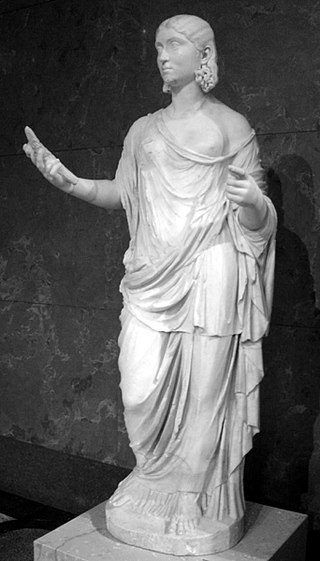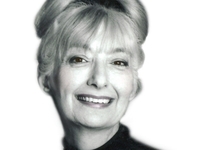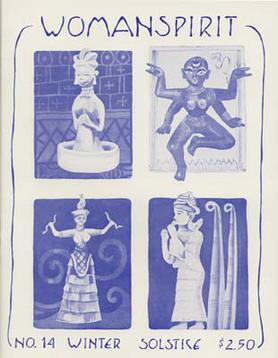
Dianic Wicca, also known as Dianic Witchcraft, is a modern pagan goddess tradition focused on female experience and empowerment. Leadership is by women, who may be ordained as priestesses, or in less formal groups that function as collectives. While some adherents identify as Wiccan, it differs from most traditions of Wicca in that only goddesses are honored.
Feminist theology is a movement found in several religions, including Buddhism, Hinduism, Zoroastrianism, Sikhism, Jainism,Neopaganism, Baháʼí Faith, Judaism, Islam, Christianity, and New Thought, to reconsider the traditions, practices, scriptures, and theologies of those religions from a feminist perspective. Some of the goals of feminist theology include increasing the role of women among clergy and religious authorities, reinterpreting patriarchal (male-dominated) imagery and language about God, determining women's place in relation to career and motherhood, studying images of women in the religions' sacred texts, and matriarchal religion.

Thealogy views divine matters through feminine perspectives including but not limited to feminism. Valerie Saiving, Isaac Bonewits (1976) and Naomi Goldenberg (1979) introduced the concept as a neologism. Its use then widened to mean all feminine ideas of the sacred, which Charlotte Caron usefully explained in 1993: "reflection on the divine in feminine or feminist terms". By 1996, when Melissa Raphael published Thealogy and Embodiment, the term was well established.

Starhawk is an American feminist and author. She is known as a theorist of feminist neopaganism and ecofeminism. In 2013, she was listed in Watkins' Mind Body Spirit magazine as one of the 100 Most Spiritually Influential Living People.

Zsuzsanna Emese Mokcsay is a Hungarian-American writer, activist, playwright and songwriter living in America who writes about feminist spirituality and Dianic Wicca under the pen name Zsuzsanna Budapest or Z. Budapest. She is the founder of the Susan B. Anthony Coven #1, which was founded in 1971 as the first women-only witches' coven. She founded the female-only style of Dianic Wicca.

Loreena Isabel Irene McKennitt is a Canadian singer-songwriter, multi-instrumentalist, and composer who writes, records, and performs world music with Celtic and Middle Eastern influences. McKennitt is known for her refined and clear soprano vocals. She has sold more than 14 million records worldwide.

The Goddess movement is a revivalistic Neopagan religious movement which includes spiritual beliefs and practices that emerged primarily in the United States in the late 1960s and predominantly in the Western world during the 1970s. The movement grew as a reaction both against Abrahamic religions, which exclusively have gods who are referred to using masculine grammatical articles and pronouns, and secularism. It revolves around Goddess worship and the veneration for the divine feminine, and may include a focus on women or on one or more understandings of gender or femininity.

The Burning Times is a 1990 Canadian documentary, presenting a feminist account of the Early Modern European witchcraft trials. It was directed by Donna Read and written by Erna Buffie, and features interviews with feminist and Neopagan notables, such as Starhawk, Margot Adler, and Matthew Fox. The Burning Times is the second film in the National Film Board of Canada's Women and Spirituality series, following Goddess Remembered (1989) and preceding Full Circle (1993).
Carol Patrice Christ was a feminist historian, thealogian, author, and foremother of the Goddess movement. She obtained her PhD from Yale University and served as a professor at universities such as Columbia University and Harvard Divinity School. Her best-known publication is "Why Women Need The Goddess". It was initially a keynote presentation at the "Great Goddess Re-emerging" conference" at the University of Santa Cruz in 1978. This essay helped to launch the Goddess movement in the U.S. and other countries. It discusses the importance of religious symbols in general, and the effects of male symbolism of God on women in particular. Christ called herself a "thealogian" and as such, made important contributions to the discipline of theology, significantly helping to create a space for it to be far more inclusive of women than has historically been the case. The term "thealogy" is derived from Ancient Greek θεά + -logy.

Monica Sjöö was a Swedish-born British-based painter, writer and radical anarcho/ eco-feminist who was an early exponent of the Goddess movement. Her books and paintings were foundational to the development of feminist art in Britain, beginning at the time of the founding of the women's liberation movement around 1970.

Parallel Dreams is Canadian musician Loreena McKennitt's third studio album, released on March 7, 1989. The album features McKennitt's own original compositions along with her interpretations of traditional material. It's one of the most successful independently-released Canadian albums ever.
Reclaiming is a tradition in neopagan witchcraft, aiming to combine the Goddess movement with feminism and political activism. Reclaiming was founded in 1979, in the context of the Reclaiming Collective (1978–1997), by two Neopagan women of Jewish descent, Starhawk and Diane Baker, in order to explore and develop feminist Neopagan emancipatory rituals.

Full Circle is a 1993 Canadian documentary. Directed by Donna Read and made in conjunction with the National Film Board of Canada, Full Circle completes Read's trilogy of documentaries focusing on women's spirituality in the Western World at the end of the 20th century, the Goddess movement, and feminist Wicca new religious movements. The preceding films, Goddess Remembered (1989) and The Burning Times (1990), along with Full Circle were released as Women and Spirituality: The Goddess Trilogy by AliveMind in 2008 on DVD.

Merlin Stone was an American author, artist and academic. She was an important thinker of the feminist theology and Goddess movements and is known for her book When God Was a Woman.

A matriarchal religion is a religion that emphasizes a goddess or multiple goddesses as central figures of worship and spiritual authority. The term is most often used to refer to theories of prehistoric matriarchal religions that were proposed by scholars such as Johann Jakob Bachofen, Jane Ellen Harrison, and Marija Gimbutas, and later popularized by second-wave feminism. These scholars speculated that early human societies may have been organized around female deities and matrilineal social structures. In the 20th century, a movement to revive these practices resulted in the Goddess movement.
Jean Shinoda Bolen is an American psychiatrist, Jungian analyst and author. She is of Japanese descent. A Distinguished Life Fellow of the American Psychiatric Association and a Diplomate of the American Board of Psychiatry and Neurology, she is an emeritus clinical professor of psychiatry at Langley Porter Psychiatric Institute, UCSF Medical Center and member of the C.G. Jung Institute of San Francisco. She is the author of thirteen books in over one hundred foreign editions. She was an NGO delegate to the United Nations Commission on the Status of Women (2002-2018).
Postmodern religion is any type of religion that is influenced by postmodernism and postmodern philosophies. Examples of religions that may be interpreted using postmodern philosophy include Postmodern Christianity, Postmodern Neopaganism, and Postmodern Buddhism. Postmodern religion is not an attempt to banish religion from the public sphere; rather, it is a philosophical approach to religion that critically considers orthodox assumptions. Postmodern religious systems of thought view realities as plural, subjective, and dependent on the individual's worldview. Postmodern interpretations of religion acknowledge and value a multiplicity of diverse interpretations of truth, being, and ways of seeing. There is a rejection of sharp distinctions and global or dominant metanarratives in postmodern religion, and this reflects one of the core principles of postmodern philosophy. A postmodern interpretation of religion emphasises the key point that religious truth is highly individualistic, subjective, and resides within the individual.

Ecofeminism integrates feminism and political ecology. Ecofeminist thinkers draw on the concept of gender to analyse relationships between humans and the natural world. The term was coined by the French writer Françoise d'Eaubonne in her book Le Féminisme ou la Mort (1974). Ecofeminist theory introduces a feminist perspective to Green politics and calls for an egalitarian, collaborative society in which there is no one dominant group. Today, there are several branches of ecofeminism, with varying approaches and analyses, including liberal ecofeminism, spiritual/cultural ecofeminism, and social/socialist ecofeminism. Interpretations of ecofeminism and how it might be applied to social thought include ecofeminist art, social justice and political philosophy, religion, economics, contemporary feminism, and literature.

WomanSpirit was a lesbian feminist quarterly founded by Ruth and Jean Mountaingrove and produced collectively near Wolf Creek, Oregon. It was the first American lesbian/feminist periodical to be dedicated to both feminism and spirituality. Many of the contributors to WomanSpirit were, or became, well known within the women's spirituality movement. It had 40 publications, covering topics such as ecology, goddess myths and rituals, feminist theory, and divination. Its submissions included articles, photos, letters, book reviews, artwork, and songs.
Mary Ann Beavis is a professor emerita, St. Thomas More College, the University of Saskatchewan. She co-founded the peer-reviewed academic journal, S/HE: An International Journal of Goddess Studies, together with Helen Hye-Sook Hwang in 2021.













